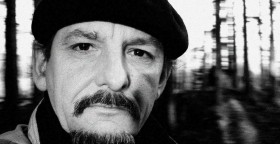


Miroslav Janek – Collected Posts on his Works
Three persons in one room. Plus a film crew. Not a lot of space but the great Czech director and cameraman Mira Janek manages to move around to observe and catch the intense atmosphere of quite a unique family: blind mother, blind daughter and seeing man. The mother is the central character and the one that communicates with the camera, the one that performs wonderfully for the viewers and the one whose story we get told without any sentimentality but with energy and humour… (Tue Steen Müller)
DOCUMENTARIES AT THE BERLINALE
The prestigious Berlin film festival, the Berlinale, offers a good selection of documentaries this year. 30 it is according to the excellent website of IDF (Institute of Documentary Film), that is based in Prague. The Berlinale takes place February 7-17 and among the films screened are two that have been writen about on this blog: “Citizen Havel” by Pavel Koutecky and Miroslav Janek (01-02-2008)
CITIZEN HAVEL CINEMA SUCCES
The documentary film about Vaclav Havel (directed by Pavel Koutecký and Miroslav Janek) has now been seen by 100.000 viewers in the Czech Republic. The film was released in January 2008, runs 119 minutes but can now also be seen in a director’s cut version that runs twenty minutes longer.
I had the chance to watch a rough cut version back in September last year, which I wrote about for this blog – title ”Documentary on Vaclav Havel”. Here follows a brief excerpt:
The film is wonderful being the result of 12 years of shooting by Pavel Koutecky who died last year in a tragic accident. The film has been completed by Mira Janek, and covers sequences from the life of Havel when president until the moment he steps down and leaves the castle in Prague. Private life and official life… A film full of humour about a gentle man, who – as he says himself – is unwilling to conform to the stereotypes…
Apart from the joyful meeting with a man of great modest charisma, the film gives you an inside to important moments in Czech politics when EU is to be the reality for the former communist country. (21-03-2008)
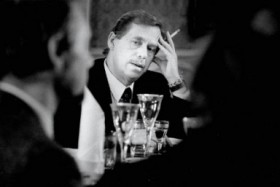
CPH:DOX 2008
DOC ALLIANCE AWARD 2008: This year’s special Doc Alliance Award goes to Pavel Koutecky and Miroslav Janek for “Citizen Havel” (16-11-2008)
CZECH DOC 2009
Better late than never they seem to think in Czech Republic, a country with a fine documentary tradition. This is what is reported from the IDF (Institute of Documentary Film) Headquarter in Prague, from one of the best written and edited doc sites, address below:
At the Czech Lion Awards nomination ceremony Friday, January 30, the Czech Film and Television Academy presented special awards to three Czech documentary films. Since a separate category for Best Documentary Film has only been created this year, members of the Academy selected the following from a shortlist of twelve titles made from 1993 to 2007: Czech Dream by Filip Remunda and Vít Klusák; Marcela by Helena Třeštíková, and Nicholas Winton – The Power of Good by Matej Mináč.
All great films, I can add. Award as Best Documentary Film 2008 went to Citizen Havel, by Pavel Koutecky and Miroslav Janek. My comment: Of course. (02-02-2009)
THE BALUITY GHETTO (2009)
I owe Pavel Stingl an apology. I never believed that it would be possible to combine his moving story about the Czech Jews who were deported to the Lodz ghetto with the story about the people who live there today in, yes, you could also call it a ghetto with another, of course completely different, meaning of the word.
But he has succeeded to do so with the help of cameraman/director Miroslav Janek and the careful and never-going-for-the-easy-solution editing work of Tonicka Jankova. Out comes a big and important film, a historical as well as an actual interpretation of lives lived, and lives lost.
The part about the Czech Jews Stingl is narrated through close-up interviews with the survivors, who convey their horror stories about how their dear ones were sent off to Auschwitz or died right in front of them, of starvation or illness. These stories are carried by the photos from the Baluity Ghetto taken by Henryk Ross, who could move freely around and documented the ghetto life with more than thousand photos. In the part about the Poles today – who live where the Jews used to live – the camera catches interiors of incredible poverty and situations with people, who for some are old enough to remember that the Jews lived there, and situations with young people who perform antisemitic graffitti on the walls. Misery and aggression. Lack of education and knowledge about the past. Czech Republic/Poland, 2008, 83 mins. (21-07-2009)
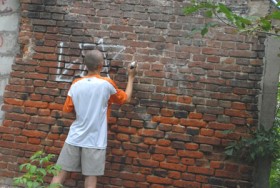
The Baluity Ghetto
THE CONFESSIONS OF KATARYNA K (2009)
Three persons in one room. Plus a film crew. Not a lot of space but the great Czech director and cameraman Mira Janek manages to move around to observe and catch the intense atmosphere of quite a unique family: blind mother, blind daughter and seeing man. The mother is the central character and the one that communicates with the camera, the one that performs wonderfully for the viewers and the one whose story we get told without any sentimentality but with energy and humour. Very much present is also the hyperactive daughter, who dances in circles when the mother sings – and the husband, always in the background doing something in the kitchen, or taking a nap on his chair or smoking a cigarette on the balcony. Only once Kataryna forces him to the forefront to tell the story about how the two of them met. Wonderful!
Kataryna K. comes from Ukraine. She went to Prague, met her Honza, got pregnant and gave birth to a girl, who inherited her sight handicap. Kataryna talks through the whole duration of the film and stays passionately around the Jewish rituals and songs she knows about. Archive from their wedding highlights this very important event in their life.
A room with music, Kataryna rehearses the performances she is doing outside the room – and sometimes she sits at a desk and talks to the camera. Or at the piano. The room is full of cakes and the film is in the good sense of the word simply sweet! What a Life and what a Woman. Czech Republic, 2009, 53 mins., for Czech Television (01-08-2009)
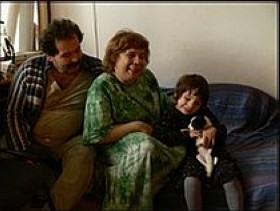
The Confessions of Kataryna K.
CINEMATEKET IN COPENHAGEN
Special service for our Danish readers – about many fine documentaries to be watched at the Film House in Copenhagen at Cinemateket, run by the Danish Film Institute:
Der er meget at komme efter i Cinemateket i februar måned, hvis man er til dokumentar. 3 af de 8 film i en tjekkisk filmserie er dokumentarer, alle sammen fyldigt omtalt eller anmeldt med links på denne blog: det klassiske observerende mesterværk ”Citizen Havel” af Pavel Koutecky og Miroslav Janek, den banebrydende/underholdende/kritisk satiriske ”Czech Dream” af Vit Klusak og Filip Remunda, og Helena Trestikovas sociale ”René”. Høj kvalitet, som jeg så ofte har skrevet på denne plads: ”East Beats West”.
RIPPING REALITY
The Hot Docs Canadian International Documentary Festival (April 29 – May 9) has introduced an interesting category in this year’s festival programme: Ripping Reality. Ten films have been chosen that in each their own way have added something new to the documentary genre in the last decade. I was asked to give my point of view on this and listed 10 Eastern and Central European works that are close to my heart and demonstrates originality and innovative strength. The Hot Doc people, led by festival director Sean Farrell, has put up a website that has a lot of interesting texts on the state of the art of the documentary. Here is my text contribution for the initiative: The last decade of documentaries, a new wave or new waves… well, you can have a look at it from different angles. As a documentary workshop organizer, both in my time as director of EDN (European Documentary Network) and now as a free lancer, I see more and more upcoming talents who try to fight their ways through endless sessions of
pitching projects to public broadcasters, whose editors have been forced to go more and more mainstream. The battle is lost as it was said by ex-leader of Arte France documentary section, Thierry Garrel, and what he meant was that in the most important place for creative documentaries, Arte, the formatting has arrived and will stay. The same can be said for ”Storyville”, where Nick Fraser a decade ago could take risks, where he today is threatened by the BBC wish for higher ratings. Play safe, this is what we have to do nowadays, another Arte editor said to me the other day.
So even if we see more emerging talent, documentary festivals all over, a growing audience, to watch documentaries have become a natural thing, often in the cinemas or on the net or on dvd – at the same time as public television, and many of the bigger festivals by the way, goes for the formatting of the creative documentary. Quantity before Quality. The result is that the average television viewer gets the impression that a documentary is a film, where there is voice-off talking from start till end, a lot of interviews and quick editing.
The exceptions that I found, the originality, the personal films with a personal style or handwriting – I saw them primarily in the Eastern part of Europe, where I have been working and where the message to the young filmmakers have been quite clear: You should know about the Western European documentary market and its demands, but please please keep your own voice. The coming list includes films that I have found important from the last decade from the East of Europe:
1. CITIZEN HAVEL (Pavel Koutecky, Miroslav Janek, Czech Republic, 2008) Yes, it is quite classical in its observational style and therefore also untypical for documentaries of today, where for instance Arte has dropped the observational documentary from its programming policy. 12 years of filming and what a character!
2. BLIND LOVES (Juraj Lehotsky, Slovakia, 2008 ) Five years of research getting to know his blind characters and then writing a script using situations and dialogues that he had heard to put together a four episode hymn to Love. A first feature length from Lehotsky!
3. THE MOSQUITO PROBLEM (Andrey Paounov, Bulgaria, 2004) Intelligent, non-linear dramaturgy, humour, many layers, shot on Film.
4. 66 SEASONS (Peter Kerekes, Hungary/Slovakia, 2003) Inspired by Jan Gogola, dramaturgical icon of Czech Republic, this is a way to deal with history in a constant surprising humorous way.
4. THE BELL (Audrius Stonys, Lithuania, 2007) It starts as a piece of journalism and shifts slowly into a piece of cinematographical beauty taking the viewer by surprise. A true poet.
5. BEFORE FLYING BACK TO EARTH (Arunas Matelis, Lithuania, 2005) A masterpiece daring to deal with hospitalised children with cancer in a lively, non-sentimental way.
6. RABBIT A LA BERLIN (Bartek Konopka, Poland, 2009 ) Well, it was nominated to an Oscar, quite unusual for a film that is playful, multi-layered, original in approach to its theme, super!
7. CZECH DREAM (Filip Remunda, Vit Klusak, Czech Republic, 2004) Long before the Yes-men and much more cinematic, satirical on a high level, a breakthrough for new Czech documentary.
8. ANOTHER PLANET (Ferenc Moldovanyi, Hungary, 2008) A cinematically beautiful hymn to the children of this world, Moldovanyi has his own style of passion.
9. CASH AND MARRY (Atanas Georgiev, Macedonia/Croatia, 2009) Original in its form, very actual in its theme, European problem number One today, getting into the EU paradise!
10. CHEMO (Pawel Lozinksi, Poland, 2009) The title says what it is about, the form is pure observation through close-ups, it is made with love and knowledge about Cinema – putting together sound and image in a personal, organic flow. (PHOTO).
I could mention many others. And these new films don’t just come out of the blue, they build on a tradition of great filmmaking, a tradition that they oppose or continue: Russian Kossakovski and Dvortsevoy, Latvian Herz Frank, Ivars Seleckis and Juris Podnieks, Polish Marcel Lozinski and Kieslowski, Czechoslovak Dusan Hanak, Estonian Mark Soosaar and many others further back in time. (10-04-2010)
PAVEL KOUTECKY AWARD
Koutecky died tragically in 2006, 50 years old, after having completed twelve years of filming Vaclac Havel. The material was edited by his colleague Miroslav Janek and the masterpiece Citizen Havel was born.
An award has been set up in the name of Pavel Koutecky. For the fifth time it is to be handed out (followed by 100.000 CZK). In Prague on June 6. The nominees are the following Czech documentaries: All for the Good of the World and Novosice (Vit Klusak), Bear Islands (Martin Rysavy), Czech Granada (Jan Papousek), Earthlings, who are You voting for (Linda Jablonska), Filmmaker, Fan, freak (Katerina Mikulcova), For Semafor (Miroslav Janek), and Matchmaking Mayor (Erika Hnikova). (02-06-2011)
DOC ALLIANCE STRIKES AGAIN
On this site the vod (video on demand) initiative Doc Alliance, run by five European film festivals, has been praised several times for its quality in film selection and presentation, and for its cheap prices not to forget.
Doc Alliance has again a generous marketing offer to have people know about the vod. A handful of films about children can be streamed for free (until June 5), among them the masterpiece by Miroslav Janek, Unseen, which has the following catalogue annotation:
„People imagine, that the blind live in darkness and know nothing about the things around them. But they have a concrete image of everything.“ says photographer Daniela Horníčková, who led blind children from the Prague Jaroslav Jeek School to capture their surroundings on still camera. The children took pictures at school, on field trips, at home or the dormitory mostly focusing on things they knew by touch. In 1995, director Miroslav Janek entered the project and shot a documentary stimulating comprehension of the issues and uniqueness of the creative process. (03-06-2011)
TOP STILLS
af Tue Steen Müller og Allan Berg Nielsen
Vi forbinder bestemte historiske begivenheder med bestemte personer, de er vores hovedpersoner før, filmene gør dem til det. Dobbelt betydningsbærende. De tre stills i Filmkommentarens hoved kunne være de to bloggeres personlige bud på tre sådanne scener med tre særlige medvirkende i tre uomgængelige film. / The three stills above are from films strongly appreciated by the two bloggers, in important scenes and with main characters in the films as well as in specific periods of our history.
1) Vietnamkrigen erindret af Robert McNamara under sindrigt pres i Errol Morris: The Fog of War (2003). ”Det er måske Morris’ berømte spejlarrangement ved interviews, som gør det. McNamaras blik, fortælling og tolkning plus hans intensitet former uafrysteligt min opfattelse af verdenshistorien den sidste halvdel af 1900-tallet.” (Allan Berg Nielsen i filmkommentaren.dk) / The Vietnam War as it was recalled by Robert McNamara, pushed by Errol Morris in “The Fog of War” (2003). “Maybe it is the famous mirror arrangement at the interviews that does it. The glance of McNamara, his storytelling, his interpretation plus his intensity shakes completely my look at world history during the last half of the 20th century.”
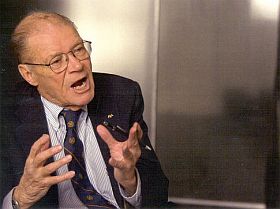
The Fog of War
2) Militærkuppets fly mod præsidentpaladset iagttaget af Salvador Allende omgivet af livvagter i Patricio Guzman: “The Battle of Chile” (1975-1979). / The attack on La Moneda watched by Salvador Allende surrounded by his guards in Patricio Guzman’s “The Battle of Chile” (1975-79). “How could a team of five – some with no previous film experience – working with one Éclair camera, one Nagra sound recorder, two vehicles and a package of black-and-white film stock sent to them by the French documentarian Chris Marker produce a work of this magnitude?” (Pauline Kael in The New Yorker).
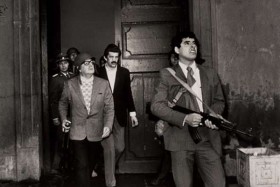
The Battle of Chile
3) Den nye tjekkiske politiske kultur levet af Vaclav Havel i blot en af utallige værtshusdiskussioner i Pavel Koutecký og Miroslav Janek: Citizen Havel (2008). ”I 12 år fulgte Pavel Koutecký og hans hold Havel, i det offentlige og i det private rum og ud af det er kommet en helt vidunderlig, morsom og gribende fortælling om en helt vidunderlig mand, der hele vejen igennem beholder sin integritet og viser at den ærlige og kærlige mand naturligvis ikke kan undgå at løbe ind i problemer, når han skal have med politik at gøre.” (Tue Steen Müller i Filmkommentaren.dk) / The new Czech political culture as it was lived by Vaclav Havel in one of many café discussions in Pavel Koutecky and Miroslav Janek’s Citizen Havel (2008). “For 12 years Pavel Koutecky and his crew followed Havel, in public and privately, and from that material a wonderful film has been made, funny and touching it is about a fine man, who keeps his integrity and shows that an honest and loveable man of course must run into problems when he enters politics.” (12-01-2012)

Citizen Havel
OLGA (2014)
This is a film, that I can’t wait to see. The main character is Olga Havlová, the director is Miroslav Janek. It guarantees the quality. Janek made “Citizen Havel” into an unforgettable film, when he took over the material that Pavel Koutecky had filmed during more than a decade. In the film you see Olga next to Havel, what a charisma, what a personality full of dignity, I thought. And now there is a film on its way with her as the main focus. Here is what I have taken from the IDF (Institute of Documentary Film) website:
May 15, 2014 is the date of the distributional premiere of Olga – the newest documentary by the renowned director Miroslav Janek. Olga is a portrait of the late Czech president Václav Havel’s wife, assembled in an interesting way. It enables the audience to look into the previously unpublished archives and shows primarily the civil side of the main character.
Olga Havlová is remembered by her friends as the closest partner of Václav Havel, as a friend who never spoils a good laugh, a generous host, passionate player and nature lover. In their eyes, she was s a brusque commentator, a brave and dilligent dissident, and a wise and practical woman. Those who never met her in person remember her as a respectable first lady and the founder of the very first charitable organization in our country. On July 11th, 2013 Olga would have lived to celebrate her 80th birthday. This film is not to be made to celebrate the anniversary, but to reflect upon the way we remember her.
The police couldn’t break her, the Castle didn’t change her: The remarkable story of Václav Havel’s reluctant first lady. Olga Havlová was the closest and most trustworthy companion of Václav Havel, a friend who was never a spoilsport – on the contrary, she initiated the fun herself – a generous host, passionate games-player and mushroom-gatherer, a nature-lover, sharp commentator, courageous and diligent dissident; a wise and practical woman, always with her feet on the ground and true to herself. In 1990 she founded the Výbor dobré vůle (Committee of Good Will), still doing its good work today. (11-05-2014)
2
Have to confess that I did not know about the online documentary film magazine DOK Revue. Now I do, and it is no surprise that this fine initiative comes out of the Czech Republic, this time from the Jihlava International Documentary Film festival, whose energetic director Marek Hovorka together with Petr Kubica has made an interview with Miroslav Janek (photo) on the occasion of the release of his film “Olga”. I take a couple of quotes from the interview, link below to he magazine and the whole text:
Was the latest film Olga meant to be an amendment to Citizen Havel? To what extent were you affected by the work on Citizen Havel?
Apart from the fact that Olga Havlová was Václav Havel’s wife, those two films have nothing in common. They are formally completely different. Citizen Havel was made by Pavel Koutecký, the material had been ready and I was only an editor who had to work with what was available, although Tonička was my co-editor, too (Janková, editor’s note). Whereas in the case of Olga, I started from the scratch. It is also composed of archival materials, but they come from all sorts of sources. And yet, thanks to Citizen Havel I got to know Olga a bit better. I could feel her persona and found out what impression she makes on the screen.
The film is, to a large extent, concerned with the period of Czech history which you did not personally experience. (Janek was out of the country 1979-1996, ed.). Is this fact one of the reasons why you find this period so attractive?
I did not experience the period of dissent, and perhaps I like to experience it through my films. In the case of Olga, I knew that this period was of utmost interest to me, but not because of dissent. I was interested in the spirit of this movement, their world, their humour. It provided a sort of a counterbalance to the surrounding idiocy, the stupidity of the police. And this may be why so much space in the film is dedicated to this issue, although some might find it inappropriate. (14-05-2014)
3
The Czech production company Film&Sociology was so kind to send me a vimeo link so I could watch Janek’s film on Olga Havlova, which I had read about passionately because of ”Citizen Havel”, where she is very much present with her husband Vaclav, a film shot by Pavel Koutecky and put together by Miroslav Janek. 160.000 saw the film in Czech cinemas.
The film about Olga lives totally up to what I had expected. It is lively, entertaining, has wonderful archive material (Olga died in 1996) and gives the atmosphere of a period, where she like her husband, who was in prison several times, was under constant surveillance by the secret police. And later on was ”equipped” with bodyguards to accompany her as ”the first Lady” of the country. The bodyguards talk in the film as do several members of the group of dissidents – about the jolly underground meetings and parties they had, often initiated by Olga, who is praised – just one out of many words and sentences – for her subtle humour. And about Charter 77, the samizdat activity, the Movement for Civic Freedom. The way the surveillance reports are conveyed gives the film this typical absurdity you often find in Czech cinema.
It’s history and it’s a film about a woman with an extraordinary charisma. She did not like (her husband says so) the pomposity of being ”the first lady”, she loved the theatre, she was an usher, she was Havel’s first dramaturg and the one, who often had to ”bring him down to earth”.
Many words are taken from her memoirs and Janek found a woman, who knew Olga, and had the kind of voice she had to read pages about her upbringing in communist Czechoslovakia. Editor Tonicka Jankova and director Miroslav Janek have done a great work to make this archive film fresh to watch. The montage is brilliant. Janek has said that he – in ”Citizen Havel” – could feel ”her persona”. Director and editor has succeeded to offer the audience the same. You never get really close to Olga, she wanted to keep her integrity and dignity, the filmmakers respect that dignity, her unsentimentality and humour – it is a film full of admiration for the protagonist, playful, informative, what more could you ask for? (22-05-2014)
Olga, Czech Republic, 2014, 87 mins.
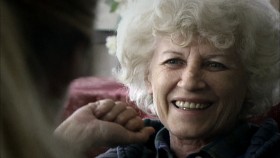
JIHLAVA 2014
1
The day after DOKLeipzig (below), the Jihlava International Documentary Film Festival (IDFF) announces its programme schedule, October 23-28. The newsletter from the Czech festival does also, as DOKLeipzig, focus on statistics in its first paragraph. After headline ”57 world, international or European premieres at this year’s Jihlava IDFF”, it goes like this ” This year, the traditional competition sections will offer a unique blend of auteur documentaries, most of which as world, international or European premieres. In the competition of world documentaries Opus Bonum the IDFF Jihlava will present 5 world premieres, 5 international premieres and 1 European premiere. In Between the Seas, the competition of Central and East European documentary film, there will be 4 world premieres, 2 international and 2 European premieres. The Czech Joy competition will present 10 world premieres.”
All right, let’s go to content, the films, where I can only salute that there are films from Guinea-Bissau, Brazil, Argentina, South Korea, Philippines, Japan and – I know I am repeating myself – “Euromaidan. Rough Cut” from Ukraine.
I will be in Jihlava 3 full days and apart from taking part in a couple of industry activities, I am looking forward to watch films and why not dig into the section “Czech Joy”, where there are films by Veronika Liskova, Miroslav Janek and Jan Gogola. I am a big admirer of Janek, whose films on Vaclav Havel and on Olga Havlova have been praised on Filmkommentaren.
I have been to Jihlava several times, mostly for the workshop of Ex Oriente, but also for the festival, once in the jury, and a compliment to the film selection: it is always surprising and out-of-mainstream festival profiles. (08-10-2014)
2
At night world premiere of Miroslav Janek’s ”The World According to Brabenec”, full house in the big cinema, wonderful atmosphere because of the charismatic old man. One more remarkable film from the hands of Janek, here is the catalogue description:
“Journalist Renata Kalenská’s book of interviews with member of the Plastic People Vratislav Brabenec recorded not only his memories of the underground years, but also the author’s experiences with this highly distinctive individual. This cinematic sequel builds on those experiences as it captures her additional interviews with Brabenec – improvised talks at places that hold some meaning for Brabenec or Kalenská. The result is several scenes of irrelevant philosophising, self-deprecating humor, and commentary on the life of birds and on nature in general. The conversations, recorded mostly by hand-held camera, are interspersed with poetic citations. ’Do you ever feel happy?’ ’I don’t like the word happy at all. I equate happy with stupid.’ ’I’m unhappy with you. So I guess I’m un-stupid.’ ” (25-10-2014)
OLGA ON DOC ALLIANCE
DocAlliance starts its new year with a present to its (hopefully) many viewers: ”Olga” by Miroslav Janek is available for free viewing until January 11. It is a film that was on my Best of 2014 – here is a quote from the review:
Many words are taken from her memoirs and Janek found a woman, who knew Olga, and had the kind of voice she had to read pages about her upbringing in communist Czechoslovakia. Editor Tonicka Jankova and director Miroslav Janek have done a great work to make this archive film fresh to watch. The montage is brilliant. Janek has said that he – in ”Citizen Havel” – could feel ”her persona”. Director and editor has succeeded to offer the audience the same. You never get really close to Olga, she wanted to keep her integrity and dignity, the filmmakers respect that dignity, her unsentimentality and humour – it is a film full of admiration for the protagonist, playful, informative, what more could you ask for…? (06-01-2015)
MIROSLAV JANEK
I have run into a slate of giving verbal flowers to documentarians, whose work I appreciate a lot and who are to be highlighted right now for one reason or the other. Earlier today it was Sérgio Tréfaut who visits Copenhagen and a couple of days ago it was Filip Remunda with two new films. Tonight it is due to the exceptional fine offer given to us by the equally exceptional DocAlliance: An online retrospective with director, cinematographer and editor Czech Miroslav Janek FOR FREE, so go ahead folks out there, it is world class.
7 films to be watched available until December 20. ”Citizen Havel” (2007), ”Olga” (2014), ”The Gospel According to Brabenac” (2014) and the beautiful ”The Unseen” (1997) about blind children taking photographs plus 3 more I have not seen: ”For Semafor” (2010), ”Purple Snails” (2001) and ”Little City in Space” (1984).
You can read much more about Janek on the site of DocAlliance, they have good writers and I can fully second the characterisation of Janek having ”empathy without pathos” towards his characters. I have met and worked with him, when we both were tutors at the Ex Oriente, we are the same generation, it helps a conversation with a man, who has an unpretentious and professional approach to filmmaking.
Personally I am looking forward to having this small MacBook Cinema festival – join me, you won’t regret it! (07-12-2015)
